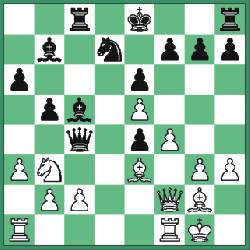|
Time
Out
Reuben Fine Chess
Well, your quest for knowledge should not come to an end with studying the " Road to Chess Mastery" only. This is a good book, but there are a lot better ones which you must read to enjoy and understand the game. Books on the middle game are particularly interesting . Dr Max Euwe and American Grandmaster Reuben Fine wrote two wonderful books on this subject. Then Ludek Pachmann's books on strategy and tactics are immensely readable and instructive.
Most of the old books are written in a lucid language laced with wit and humour. But the modern writers, led by the Russian trainers, usually concentrate on the educative side and most of their books are designed for the budding masters.
Reuben Fine also wrote " Basic Chess Endings", the first comprehensive work on endgames of all kinds. This book was for many years the practical guide for chess players of virtually all categories. Interestingly enough, British Grandmaster Jonathon Speelman wrote a whole book on the mistakes he found in Basic Chess Endings! That, of course, did not diminish the importance of Fine's great work. Chess is getting enriched all the time by new ideas and discoveries. And that is true even about those technical endings.
Fine did not have a long chess career. He was one of the leading players in the world in the thirties. Fine, Botvinnik, Keres and Flohr were the principal contenders for the world title in Alekhine's declining years. But the American was never obsessed with the game. He actually left it to become a professional psychiatrist! He lived for many years after quitting chess, but didn't come back. A rare case of overcoming chess addiction! The only other example was perhaps Oldrich Duras, who did not play in the last 40 years of his life.
The Second World War stood in the way of some great masters like Fine, Keres and Flohr. These players did not win the world championship. When the war was finally over, Botvinnik became too strong for others. He won the 1948 tournament where eight invited players took part. The tournament was organised by FIDE, after Alekhine's death in March 1946.
Here is a Fine game!
White-Reuben Fine
Black-Miguel Najdorf [B91]
New York 1948
1.e4 c5 2.Nf3 d6 3.d4 cxd4 4.Nxd4 Nf6 5.Nc3 a6 6.g3 b5 7.Bg2 Bb7 8.00 e6 9.Qe2 Nbd7 10.a3 Qc7 11.f4 Rc8 12.h3 Qc4 13.Qf2! d5 14.e5 Bc5? 15.Be3 Ne4 16.Nxe4 dxe4 17.Nb3! Qxc2 18.Nxc5 Qxf2+ 19.Rxf2 Nxc5 20.Rc1 Nd7 21.Rxc8+ Bxc8 22.Rc2 00 23.Bxe4 f6 24.Bd4 fxe5 25.fxe5 Rd8 26.Rc7 Nf8 27.Bc5 Bd7 28.Ra7 Be8 29.Bd6 Bg6 30.Bc6 Bd3 31.b4 h5 32.Rxa6 Rc8 33.Kf2 h4 34.gxh4 Ng6 35.Kg3 Kh7 36.h5 Nh8 37.Kf4 Nf7 38.Bc5 Rc7 39.Bf3 Bc4 40.Be4+ Kh6 41.Bf5 Ng5 42.Bg6 Nxh3+ 43.Kg3 Ng5 44.Ra8 1-0

Position after 17.Nb3!
-PATZER
Copyright
(R) thedailystar.net 2005
|
